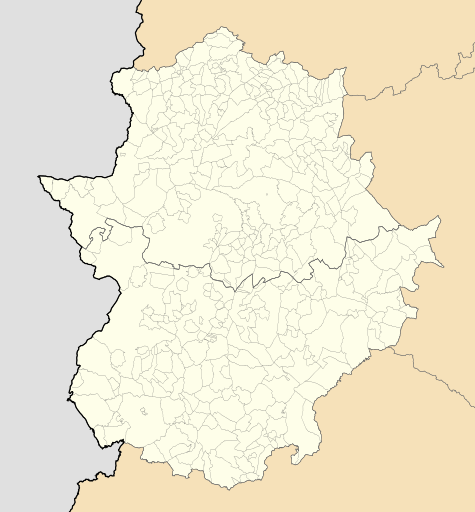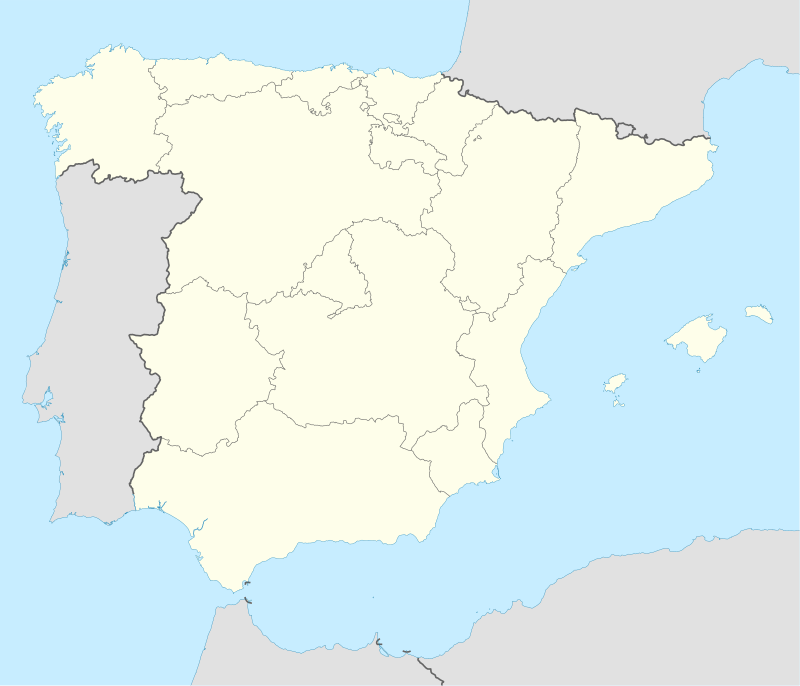Hervás
| Hervás Ervás | ||
|---|---|---|
| Municipality | ||
 View of Hervás | ||
| ||
 Hervás Location in Extremadura  Hervás Hervás (Spain) | ||
| Coordinates: 40°16′26″N 5°51′57″W / 40.27389°N 5.86583°WCoordinates: 40°16′26″N 5°51′57″W / 40.27389°N 5.86583°W | ||
| Country |
| |
| Autonomous Community |
| |
| Province | Cáceres | |
| Comarca | Valle del Ambroz | |
| Government | ||
| • Mayor | Sergio Pérez Martín (PSOE) | |
| Area | ||
| • Total | 60 km2 (20 sq mi) | |
| Elevation(AMSL) | 688 m (2,257 ft) | |
| Population (2012) | ||
| • Total | 4,190 | |
| • Density | 70/km2 (180/sq mi) | |
| Time zone | UTC+1 (CET) | |
| • Summer (DST) | UTC+2 (CEST (GMT +2)) | |
| Postal code | 10700 | |
| Area code(s) | +34 (Spain) + 927 (Cáceres) | |
| Website |
www | |
Hervás (Spanish pronunciation: [eɾˈβas]; Extremaduran: Ervás) is a Spanish town in the north of the province of Cáceres. It had 3,839 inhabitants in 2005. It is 120 km from Cáceres and 90 km far from Salamanca. It is the capital of the Valle de Ambroz comarca in the Ambroz River valley. It has a soft continental climate.
History
In the 12th century, the Knights Templar built Santihervás hermitage under the patronage of the Christian martyrs Gervasius and Protasius. By this hermitage the town started to grow during 13th and 14th centuries.
From its foundation on it belonged to the lordship of Béjar in the Kingdom of Castile: it passed to Cáceres jurisdiction on the 30 November 1833.
La Judería
Lots of Jewish families started to settle from the 15th century on, they even maintained their rituals some years after 1492. The Jewish quarter (Judería) has been maintained and it is one of the tourist lures of the town.
Economy
The textile industry was very important from the 18th to 19th centuries. After that, the chestnut wood industry, handicrafts and tourism have been the pillar of Hervás' economy.
Remarkable buildings
- La Enfermería de los Religiosos Franciscanos (Franciscan Sickbay), 18th century, current town hall.
- El Convento de los Religiosos Trinitarios (Trinitarian Convent), current Junta de Extremadura Hospedería (chain of four stars hotels run by regional government).
- Pérez Comendador-Leroux Museum, 18th century.
- La Iglesia Parroquial de Santa María (Saint Mary's Parish Church).
External links
| Wikimedia Commons has media related to Hervás. |
- Hervás City Council website (in Spanish)
